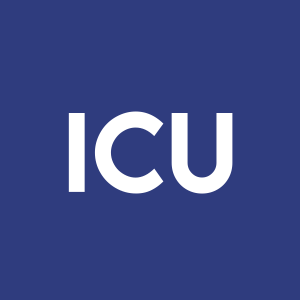SeaStar Medical Reports Positive Early Results for QUELIMMUNE Therapy in Pediatric Acute Kidney Injury (AKI) at the 5th International Symposium on Acute Kidney Injury in Children
Rhea-AI Summary
SeaStar Medical (NASDAQ: ICU) announced positive preliminary results from the SAVE Surveillance Registry for its QUELIMMUNE therapy in treating pediatric Acute Kidney Injury (AKI). The data, presented at the 5th International Symposium on AKI in Children, showed impressive outcomes from the first 21 pediatric patients with AKI and sepsis requiring Renal Replacement Therapy (RRT).
Key results include zero device-related adverse events, a 76% survival rate at Days 28 and 60, and 71% survival at Day 90. Among ECMO patients, the therapy demonstrated a 60% survival rate at Day 90. For survivors without prior ESRD or recent kidney transplant, 82% were dialysis-free at Day 90.
The SAVE Registry will continue collecting Real-World Evidence for up to 300 patients to support broader adoption and inform payer discussions.Positive
- Zero device-related adverse events or infections reported
- 76% survival rate at Day 28 and Day 60, with 71% survival at Day 90
- 60% survival rate for ECMO patients at Day 90
- 82% of surviving patients were dialysis-free at Day 90
- Potential 50% reduction in loss of life compared to historical data
Negative
- Limited sample size of only 21 patients in initial results
- Full 300-patient data still pending for comprehensive validation
News Market Reaction – ICU
On the day this news was published, ICU declined 0.37%, reflecting a mild negative market reaction. Argus tracked a peak move of +5.0% during that session. Argus tracked a trough of -10.2% from its starting point during tracking. Our momentum scanner triggered 2 alerts that day, indicating moderate trading interest and price volatility. This price movement removed approximately $62K from the company's valuation, bringing the market cap to $17M at that time.
Data tracked by StockTitan Argus on the day of publication.
Data show results consistent with clinical trial experience
A high level of safety – no device-related adverse events
Strong survival data extending to 90 days
DENVER, Sept. 29, 2025 (GLOBE NEWSWIRE) -- SeaStar Medical Holding Corporation (Nasdaq: ICU), a commercial-stage healthcare company, announced today positive preliminary results from the SAVE Surveillance Registry presented on Saturday, September 27, 2025, at the 5th International Symposium on Acute Kidney Injury in Children. The SAVE Registry presentation highlighted the role of QUELIMMUNE (Selective Cytopheretic Device for Pediatrics, or SCD-PED) therapy in the treatment of critically ill pediatric patients with life-threatening Acute Kidney Injury (AKI) and sepsis requiring Renal Replacement Therapy (RRT).
Data from the first 21 pediatric patients with AKI and sepsis requiring RRT showed zero device-related adverse events or infections and no reports of immunosuppressive effects by the device. In addition, outcomes analyses show a
Additional analyses included survival of patients requiring extracorporeal membrane oxygenation (ECMO) and independence from renal replacement therapy (RRT) for pediatric patients without a history of end-stage renal disease (ESRD) or a recent kidney transplant. The evaluation of five patients concomitantly treated with the QUELIMMUNE therapy and ECMO showed a
“As a clinician and nephrologist, I have watched for more than two decades the damage to organ function and loss of life due to the hyperactive immune response in children and young adults who deserve better treatments to mitigate this condition,” stated Stuart Goldstein, MD, of Cincinnati Children’s. “These results and my own clinical experience provide encouraging evidence to show early benefit of SCD-PED therapy in critically ill patients with AKI requiring RRT.”
“We continue to see consistent, reproducible results from the use of the QUELIMMUNE SCD-PED therapy in clinical practice,” stated Kevin Chung, MD, Chief Medical Officer of SeaStar Medical. “We are especially pleased that the QUELIMMUNE therapy gave the most critically ill children a fighting chance. I am certain most would not be alive today without this therapy.”
The SAVE Surveillance Registry is a Real-World Evidence (RWE) surveillance program that is designed to confirm safety and efficacy of the QUELIMMUNE therapy. Medical institutions employing the QUELIMMUNE therapy will continue to collect RWE for up to the first 300 patients treated with QUELIMMUNE. Specific outcomes data will include 90-day survival and dialysis dependency along with safety data with plans to compare to an existing control group of similar illness severity. SeaStar Medical believes that initial results from the SAVE Surveillance Registry will support broader adoption of the QUELIMMUNE therapy, inform payer discussions, and complement the company’s ongoing effort to recruit patients into its adult NEUTRALIZE-AKI pivotal trial.
The QUELIMMUNE therapy has been adopted by nationally recognized children’s medical centers in the United States. The patented technology behind QUELIMMUNE is known as the Selective Cytopheretic Device (SCD) therapy and has broad applications for treating the destructive hyperinflammation that shuts down organ function and causes loss of life.
About Acute Kidney Injury (AKI) and Hyperinflammation
AKI is characterized by a sudden and temporary loss of kidney function and can be caused by a variety of conditions such as sepsis, severe trauma, surgery and COVID-19. AKI can cause destructive hyperinflammation, which is the overproduction or overactivity of inflammatory effector cells and other molecules that can be toxic. Damage resulting from this destructive hyperinflammation in AKI can progress to other organs, such as the heart or liver, and potentially to multi-organ dysfunction or even failure that could result in worse outcomes, including increased risk of death. Even after resolution, these patients may face complications including chronic kidney disease or end-stage renal disease (ESRD) requiring dialysis. Extreme hyperinflammation may also contribute to added healthcare costs, such as prolonged ICU stays and increased reliance on dialysis and mechanical ventilation.
About QUELIMMUNE
The QUELIMMUNE™ therapy is being commercialized for children with AKI and sepsis or septic condition weighing 10 kilograms or more who are on antibiotics and being treated in the ICU with Renal Replacement Therapy (RRT). It was approved in February 2024 under a Humanitarian Device Exemption application that requires medical institutions to also participate in the SAVE Surveillance Registry and complete Institutional Review Board approvals prior to adoption and use of the QUELIMMUNE therapy. This prolongs the adoption timeline by medical institutions, but provides important data on the use of QUELIMMUNE in the “real-world” setting.
Data from two clinical studies of the QUELIMMUNE therapy, published in Kidney Medicine, showed a
In January 2025, SeaStar Medical was awarded the 2025 Corporate Innovator Award by the National Kidney Foundation for its significant contribution to improving the lives of pediatric patients with AKI based on the approval and introduction of the QUELIMMUNE therapy.
About the SeaStar Medical Selective Cytopheretic Device Therapy
The Selective Cytopheretic Device (SCD) therapy is designed as a disease-modifying device that neutralizes over-active immune cells and stops the cytokine storm that yields destructive hyperinflammation and creates a cascade of events that wreak havoc in the patient’s body. The SCD therapy has broad applications in multiple acute and chronic kidney and cardiovascular diseases, representing patients who today have no FDA-approved options for treating their disease. Unlike pathogen removal and other blood-purification tools, the SCD therapy is integrated with an existing CRRT hemofiltration system to selectively target and transition proinflammatory monocytes to a reparative state and promote activated neutrophils to be less inflammatory. This unique immunomodulation approach may promote long-term organ recovery, eliminate the need for future RRT, including dialysis, and prevent loss of life.
About SeaStar Medical
SeaStar Medical is a commercial-stage healthcare company focused on transforming treatments for critically ill patients facing organ failure and potential loss of life. SeaStar’s first commercial product, QUELIMMUNE (SCD-PED), was approved in 2024 by the U.S. Food and Drug Administration (FDA). It is the only FDA approved product for the ultra-rare condition of life-threatening acute kidney injury (AKI) due to sepsis or a septic condition in critically ill pediatric patients. SeaStar’s Selective Cytopheretic Device (SCD) therapy has been awarded Breakthrough Device Designation for six therapeutic indications by the FDA, enabling the potential for a speedier pathway to approval and preferable reimbursement dynamics at commercial launch. The company is currently conducting the NEUTRALIZE-AKI pivotal clinical trial of its SCD therapy in adult patients with AKI requiring continuous renal replacement therapy (CRRT), a life-threatening condition with no effective treatment options that impacts over 200,000 adults in the U.S. annually.
For more information visit www.seastarmedical.com or visit us on LinkedIn or X.
Forward-Looking Statements
This press release contains certain forward-looking statements within the meaning of the “safe harbor” provisions of the Private Securities Litigation Reform Act of 1955. These forward-looking statements include, without limitation, SeaStar Medical’s expectations with respect to the anticipated adoption our products; anticipated cost savings for patients, healthcare providers, and the healthcare system more generally from the adoption of the SCD therapy; the reduction in loss of life; the potential results of the Save Surveillance Registry study; t; the ability of SeaStar Medical to gain market share and generate sales with respect to the total addressable market for adult SCD applications; the ability of SCD to treat patients with AKI and other diseases; the expected regulatory approval process and timeline for commercialization; and the ability of SeaStar Medical to meet the expected timeline. Words such as “believe,” “project,” “expect,” “anticipate,” “estimate,” “intend,” “strategy,” “future,” “opportunity,” “plan,” “may,” “should,” “will,” “would,” “will be,” “will continue,” “will likely result,” and similar expressions are intended to identify such forward-looking statements. Forward-looking statements are predictions, projections and other statements about future events that are based on current expectations and assumptions and, as a result, are subject to significant risks and uncertainties that could cause the actual results to differ materially from the expected results. Most of these factors are outside SeaStar Medical’s control and are difficult to predict. Factors that may cause actual future events to differ materially from the expected results include, but are not limited to: (i) the risk that SeaStar Medical may not be able to obtain regulatory approval of its SCD product candidates; (ii) the risk that SeaStar Medical may not be able to raise sufficient capital to fund its operations, including current or future clinical trials; (iii) the risk that SeaStar Medical and its current and future collaborators are unable to successfully develop and commercialize its products or services, or experience significant delays in doing so, including failure to achieve approval of its products by applicable federal and state regulators, (iv) the risk that SeaStar Medical may never achieve or sustain profitability; (v) the risk that SeaStar Medical may not be able to secure additional financing on acceptable terms; (vi) the risk that third-party suppliers and manufacturers are not able to fully and timely meet their obligations, (vii) the risk of product liability or regulatory lawsuits or proceedings relating to SeaStar Medical’s products and services, (viii) the risk that SeaStar Medical is unable to secure or protect its intellectual property, and (ix) other risks and uncertainties indicated from time to time in SeaStar Medical’s Annual Report on Form 10-K, including those under the “Risk Factors” section therein and in SeaStar Medical’s other filings with the SEC. The foregoing list of factors is not exhaustive. Forward-looking statements speak only as of the date they are made. Readers are cautioned not to put undue reliance on forward-looking statements, and SeaStar Medical assumes no obligation and do not intend to update or revise these forward-looking statements, whether as a result of new information, future events, or otherwise.
Contact:
IR@SEASTARMED.COM








